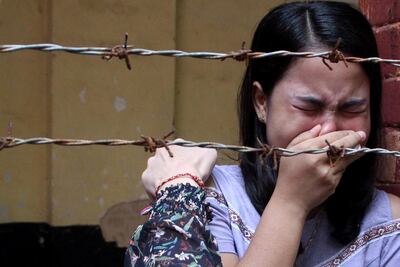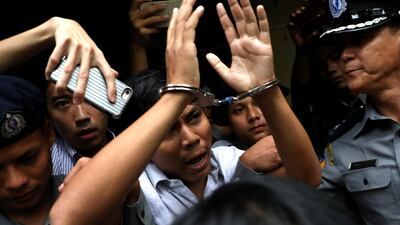Two reporters who uncovered a massacre of Rohingya civilians in Myanmar’s Rakhine State last year have been sentenced to seven years in prison with hard labour.
Reuters journalists Wa Lone and Kyaw Soe Oo were convicted on Monday of possessing state secrets in a trial that has drawn condemnation from foreign governments and press freedom advocates, who accuse Myanmar of using its criminal justice system to restrict independent media.
As the judge announced his verdict in Insein court in Yangon on Monday morning, a defiant Wa Lone insisted he had done nothing wrong. “I have no fear,” he shouted to a crowded courtroom. “I believe in justice, democracy and freedom.”

The convictions bring fresh scrutiny on the Myanmar government, which in recent weeks has bristled at mounting international pressure focused on its persecution of its Rohingya minority.
In January, prosecutors brought charges against Reuters journalists Wa Lone, 32, and Kyaw Soe Oo, 28, under the colonial-era Official Secrets Act, for possession of official information deemed “useful to an enemy”, which carries a maximum sentence of 14 years.
During court proceedings, the prosecution argued that police found classified government documents in the reporters’ car and on phones during a routine traffic stop on December 12, 2017.
_________
Read more:
The report that led to two Reuters journalists being jailed in Myanmar
The Myanmar journalists risking their lives to report on the Rohingya’s plight
Jailed Reuters journalists to testify in Myanmar court
Myanmar court charges Reuters reporters with official secrets offence
Editorial: Journalists’ protection is vital in getting to the truth
_________
Earlier the reporters had been investigating the Myanmar military’s crackdown against the Rohingya minority in Rakhine state. As the trial was underway, Reuters published their report in February, which showed how Myanmar troops massacred 10 Rohingya men and boys in the village of Inn Din and dumped their bodies in a mass grave.
Their findings were not disputed. The soldiers involved were later jailed for 10 years for murder, a rare instance of accountability against Myanmar soldiers who carried out large-scale ethnic cleansing of the Rohingya from August last year.
But the government insists that the charges brought against the men are unrelated to their reporting on the Inn Din massacre.
“They tried many times to get their hands on secret documents and pass them to others. They did not behave like normal journalists,” said judge Ye Lwin before handing down his verdict in a dark, humid courtroom packed with journalists, foreign diplomats, and relatives of the two reporters, who have been in detention since December.
As the judge announced the sentence, Kyaw Soe Oo embraced his sobbing wife, until police forced him from the courtroom.

The two reporters were ushered into a police truck before they could make a statement – a privilege they had been afforded after previous hearings. Reporters tried to block the vehicle, chanting “Let them speak!” before it sped off towards nearby Insein Prison.
The verdict comes a week after the UN’s top human rights body accused Myanmar military leaders of genocide against the Rohingya during counterinsurgency operations in northern Rakhine State last year.
Throughout the trial, the defence argued that the evidence was planted by police.
An officer named Moe Yan Naing, who was initially called as a witness for the prosecution, testified that a senior police official orchestrated a set-up to prevent the reporters from publishing their findings on Rakhine State.
Judge Ye Lwin dismissed the defence, however. “None of the prosecution witnesses agree with Captain Moe Yan Naing,” he said.
He said police found several top-secret documents on the reporters’ phones, including travel plans of Myanmar’s vice president, Myint Swe, and of Pope Francis, who visited Yangon in November 2017.
The judge also accused the reporters of having the contact information of a commander of the Arakan Army – a non-state militia representing the Buddhist Rakhine population of Rakhine State. The government considers the militia to be an illegal organisation.

But all of the information was previously published, publicly available, and therefore not secret, defence lawyer Than Zaw Aung told The National outside the court on Monday.
“It's very strange that no one inside the government was accused under the Official Secrets Act,” he said. “They only accused two reporters … Logically, if these two journalists are accused, someone from the government must be accused [for leaking them].”
The trial was unfair and an attack on the press, said Reuters Asia editor Kevin Krolicki. “Any impartial reading of this trial, of the facts that are known, by any fair standard, shows that it established the innocence of Wa Lone and Kyaw Soe Oo. They're good men, they're good journalists, and they need to be freed.”
The verdict was immediately condemned by rights groups, the UN, and foreign governments. US ambassador Scot Marciel said the case’s conclusion was a blow to “all the people of Myanmar who've worked so hard to promote fundamental freedoms, including media freedom”.
The Myanmar government should quash the verdicts and release the journalists, said Watchdog group Human Rights Watch. “These convictions won’t hide the horrors against the Rohingya from the world – they merely reveal the precarious state of free speech in the country and the urgent need for international action to free these journalists,” said the group’s Asia director Brad Adams.
The verdict was bad for Myanmar, said Khin Maung Zaw, another lawyer for the reporters. “It's bad for democracy. It's bad for the rule of law, and it's bad for the freedom of expression ... We will take any option to get their immediate release."

